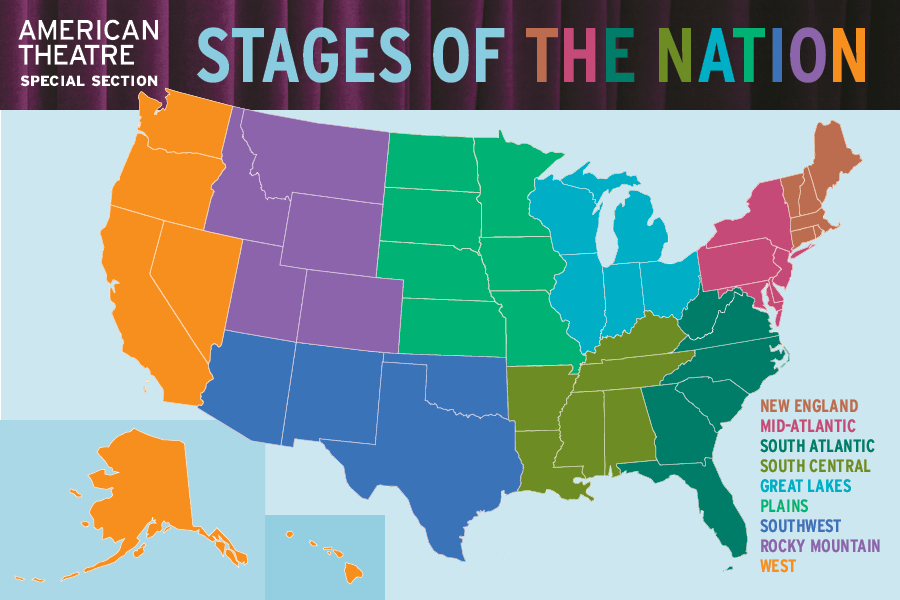‘I Want To Be Part of That’: The Urgent Work of Diversifying White Theatre Staffs
Most theatres recognize that all-white seasons and casts are wrong. So why are administration, management, and staff still so homogeneous?
 Art by Monet Cogbill
Art by Monet Cogbill
It’s a paradoxically barren and fertile time to be writing and thinking about theatre in the U.S. Like so many other practices and industries, theatres have been hit hard by the coronavirus pandemic that at the moment is raging out of control across our nation. Performances have been canceled and workers laid off or furloughed, with very few folks anticipating a full return to the stage until early to mid-2021.
In the wake of this sudden hiatus, we commissioned a series of “check-ins” with a handful of theatres in each of the nine regions (as TCG defines them, key above) to see how they were faring and what they were planning (special thanks to Eric Grode and Syracuse’s Goldring Arts Journalism program for reporting, and to Jerald Raymond Pierce for the assignment editing). In the midst of this reporting, George Floyd was killed by Minneapolis police, and the Black Lives Matter movement resurged at long last into the global consciousness. In the theatre world, this gave considerations of fundamental restructuring, already on the table, a fresh and pointed urgency.
And as we got closer to press, a group of BIPOC (Black, Indigenous, and people of color) theatre leaders and workers launched an anti-racist movement called “We See You, White American Theater” to call out the persistent racial inequities perpetrated and perpetuated by the nation’s dominant nonprofit and commercial theatres, and later the collective released an ambitious 29-page list of demands for the field that promises to set the terms of debate and reform for the coming years, as two pieces by Jerald Raymond Pierce, and one Ciara Diane, lay out. Not in direct response to these demands but as a complement to them, Aeneas Sagar Hemphill posits a historical model for the shape some of those changes could take.
In short, there’s a lot to weigh and question about the way theatre has traditionally done business within a system built on capitalist and colonialist structures. And while theatres are on an enforced hiatus, we are here joining that nationwide weighing and questioning. I think that much of our current moment of gravity and consideration is reflected in the package of stories we’ve put together. But not all of it: Dismantling so-called white supremacy in our work and our lives is an ongoing project.
This should give us hope and purpose, however, rather than despair. As Baltimore Center Stage artistic director Stephanie Ybarra put it to me, “My approach to the demands document is, pick a place to start, then pick another place, and keep going. The thing I take heart in is that the work will never be done.” Which means we all have something to do.
—Rob Weinert-Kendt
Most theatres recognize that all-white seasons and casts are wrong. So why are administration, management, and staff still so homogeneous?
Theatre students and alumni join the anti-racist groundswell in the U.S. theatre to pen statements speaking up about their experiences and demanding change.
The collective that started by saying ‘We See You, White American Theater’ makes its own demands to be seen, and fully included, at last.
Midwestern orgs are hunkering down but not defeated in their plans to stay relevant as they restructure.
At theatres in New York, Pennsylvania, and New Jersey, flexibility is the watchword.
As we face another Depression, can we dream of a new Federal Theatre Project? Any such hope begins with political organizing onstage and off.
Theatres in Maine, Vermont, New Hampshire, and Connecticut are variously going local and virtual, and reflecting deeply on their role in a changed future.
Theatres in Nebraska, Minnesota, and Missouri work to adapt to the new reality and plan for the next chapter.
Theatres in Colorado, Wyoming, Utah, and Idaho keep the theatre faith, and many or most employees, in hopes of a full return.
Theatres in Florida, Georgia, and South Carolina focus on how they can best serve their communities when they can’t do it from their stages.